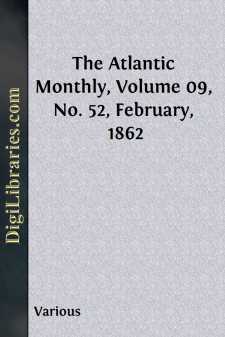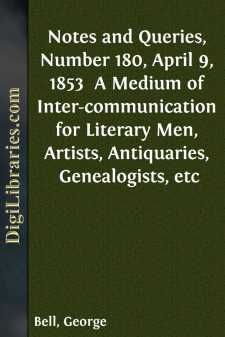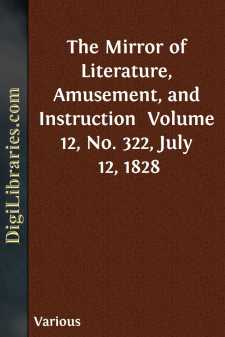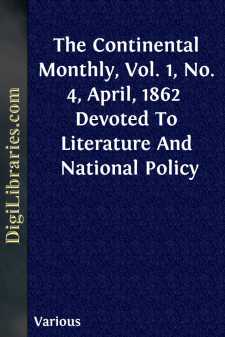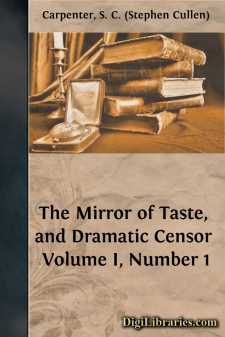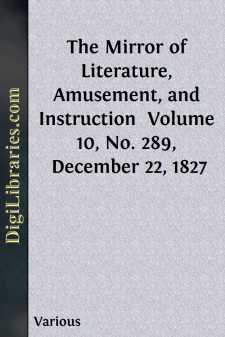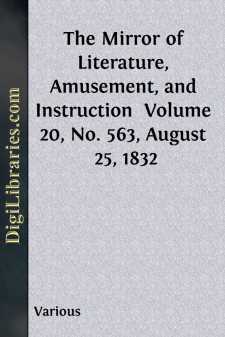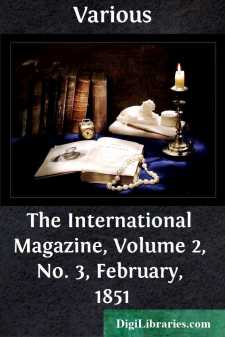Periodicals
- Art 27
- Children's periodicals 59
- Entertainment 5
- Food/Wine 2
- Games/Humor 455
- General 661
- Health 1
- History 53
- House/Home 1
- Regional 62
- Science/Nature 118
- Transportation 10
Periodicals Books
Sort by:
by:
Various
CHAPTER XX FLORENCE AND HER PROPHET It was drawing towards evening, as two travellers, approaching Florence from the south, checked their course on the summit of one of the circle of hills which command a view of the city, and seemed to look down upon it with admiration. One of these was our old friend Father Antonio, and the other the Cavalier. The former was mounted on an ambling mule, whose easy...
more...
by:
George Bell
RIGBY CORRESPONDENCE. [We are enabled, by the kindness of their possessor, to lay before our readers copies of the following characteristic letters from the well-known Richard Rigby, Esq., who was for so many years the leader of the Bedford party in the House of Commons. They were addressed to Robert Fitzgerald, Esq., a member of the House of Commons in Ireland, and Judge of the Court of Admiralty in...
more...
by:
Various
CLARENCE TERRACE, REGENT'S PARK. CLARENCE TERRACE,REGENT'S PARK.O mortal man, who livest here, Do not complain of this thy hard estate. Thomson's Castle of Indolence. The annexed continuation of our illustrated ramble in the Regent's Park is named Clarence Terrace, in compliment to the illustrious Lord High Admiral of England. It consists of a centre and two wings, of the Corinthian...
more...
by:
Various
The War Between Freedom And Slavery In Missouri. It is admitted that no man can write the history of his own times with such fullness and impartiality as shall entitle his record to the unquestioning credence and acceptance of posterity. Men are necessarily actors in the scenes amid which they live. If not personally taking an active part in the conduct of public affairs, they have friends who are, and...
more...
PROSPECTUS. The advantages of a correct judgment and refined taste in all matters connected with literature, are much greater than men in general imagine. The hateful passions have no greater enemies than a delicate taste and a discerning judgment, which give the possessor an interest in the virtues and perfections of others, and prompt him to admire, to cherish, and make them known to the world....
more...
by:
Various
TO-DAY'S AMUSEMENTS. (As they will probably be advertised in the Press of the day after to-morrow.) EXECUTION OF THE LITTLE PEDLINGTON MURDERER.—Reserved gallows seats, immediately behind the drop, commanding a clear view of the dying struggles, with chance of hearing the criminal's last confession; Lady's ticket Two Guineas. Lady and Gentleman's, ditto, three guineas. (8.30 A.M.)...
more...
by:
Various
NUMISMATIC ARCHÆOLOGY. A magnificent work upon this subject has just been completed in Paris, where it was commenced fifteen years ago. It was begun under the auspices of M. Paul Delaroche and M.C. Lenormand, member of the Institute, and well known already as one of the first authorities in the numismatic branch of archæology. Some faint idea of the greatness of the task may be given by stating that...
more...
by:
Various
THE FUGITIVE. A SCOTCH TALE. (For the Mirror.) It was now abute the gloaming when my ain same Janet (heav'n sain her saul) was sitting sae bieldy in a bit neuk ayant the ingle, while the winsome weans gathering around their minnie were listing till some auld spae wife's tale o' ghaists and worriecows; when on a sudden some ane tirled at the door pin. "Here's your daddie,...
more...
by:
Various
(Beauchief Abbey.) Mr. Rhodes, the elegant topographer of the Peak, observes, "there are but few individuals in this country, possessing the means and the opportunities of travel, who have not, either from curiosity or some other motive, visited the Peak of Derbyshire." This remark is correct; and to it we may add, that the "few" who have not personally visited the Peak, have become...
more...
by:
Various
THOMAS CHATTERTON. In the history of English literature there is no name that inspires a profounder melancholy than that of the "marvellous boy" Chatterton, of whom it must be said that in genius he surpassed any one who ever died so young, and that in suffering he had larger experience than almost any one who has lived to old age. Shelley says of him:"'Mid others of less note came one...
more...


